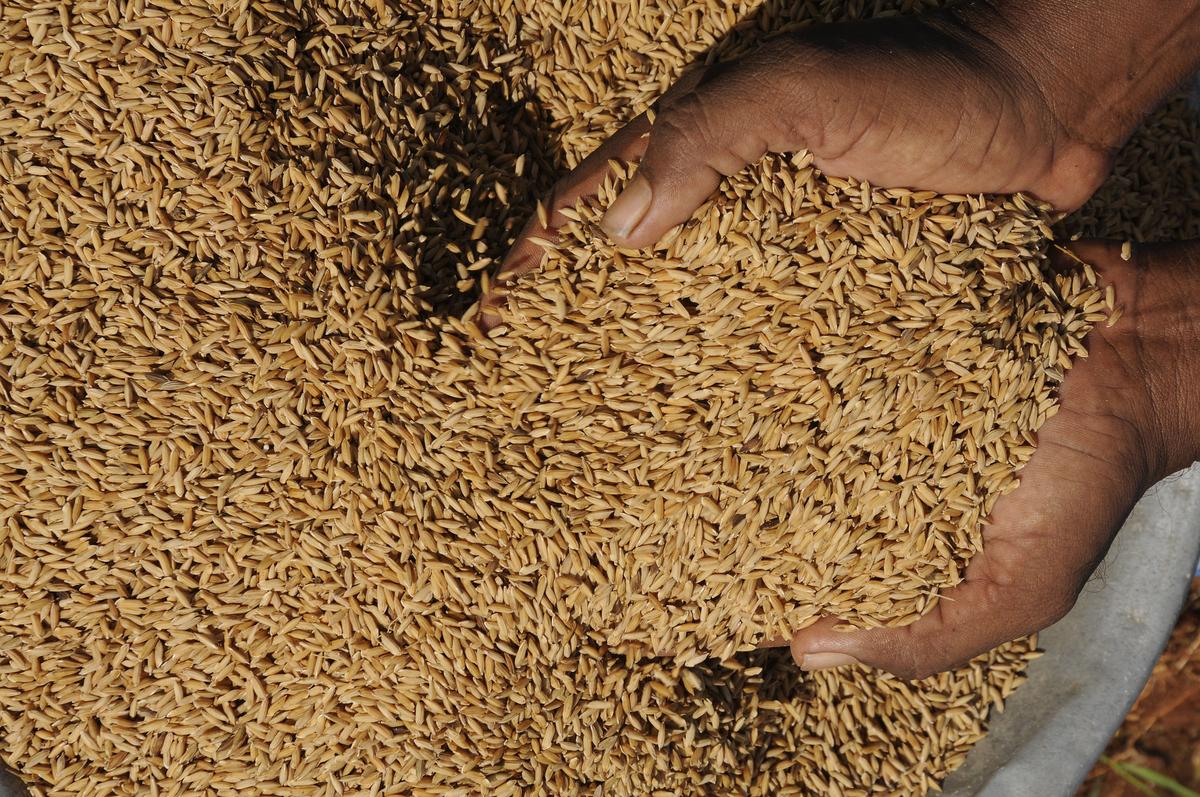
Venpongal and sakkara pongal made with traditional rice varieties such as thooyamalli, karuppu kavuni, iluppaipoo samba and thinai,
| Photo Credit: PERIASAMY M
‘Aadi Pattam Thedi Paarthu Vedhaikanum Kannaiyya’ goes a popular film song of the 1990s. The line translates to: ‘seek out the seeds, for it is Aadi season, the best for sowing seeds’. Timed with the sowing season is an upcoming seeds exhibition showcasing as many as 100 traditional varieties of paddy seeds to help farmers make judicious choices for the upcoming harvest.
“As vidhaippu kaalam (sowing season) starts, we wanted to bring seeds of traditional paddy, millets, native vegetables and tuber varieties like vettirali valli, and air potato. This will help farmers in the region choose the right seeds that suits the soil type of the Kongu belt and also the season,” says Alageswari S, founder of Iyal Vaagai, a 15-year-old environmental movement that networks with farmers in the region to switch to organic farming and sustainable lifestyle.
Their Namma Ooru Sandhai, held every second Sunday, brings farmers together to sell organically-grown fruits and vegetables, greens, cold pressed oils, millets, to name a few.
Native forest produce
| Photo Credit:
SATHYAMOORTHY M
While seed banks are considered a priceless resource that could one day prevent a worldwide food crisis, centuries ago, India was home to more than one lakh rice varieties. The varieties that encompassed a stunning diversity in taste, nutrition, pest-resistant and adaptability to a range of weather conditions that is especially crucial now in the age of climate change and natural disasters.
Alageswari talks of some of the lesser known paddy varieties of Tamil Nadu like malumulingi or thooyamalli, a traditional aromatic rice variety resembling jasmine buds. “It is believed to withstand heavy rains. As water keeps rising in the field, these paddy plants keep growing taller. There are records of how people have harvested this rice variety by moving about in the field using a parisal (coracle). Though rice is a rain-dependant crop, there are varieties like vaadan samba that can grow without much water. There is also kuzhiadichaan, karuthakar, and kullakar that grow faster to reach kuruvai stage unlike the popular belief that fast harvest is possible only with hybrid rice,” she explains adding that the objective is to bridge the gap between farmers and consumers.

As many as 100 traditional varieties of paddy seeds were on display
| Photo Credit:
MURALITHARAN A
The event features performances like paraiaatam, silambaatam, surul vaal, and karagam that shines the light on traditional art forms and artistes, as well as events where seed conservationists educate farmers on how to source the right seeds. “This platform makes native seeds accessible to farmers. They will share success stories of farmers who switched to native variety and reaped benefits. There will be programmes on marketing help to farmers besides awareness on how to choose traditional seeds from genetically modified ones.”

The exhibition also turns the spotlight on climate change that poses a big challenge for farmers and how they can cope with diseases in plants with homeopathic medicines. “This is an alternative to commercial pesticides which is a big burden off their shoulders. There will be sessions on how seeds of pepper, peas, mustard and fenugreek are effective in treatment of cold and fever too.”
Native produce also includes a variety of greens
| Photo Credit:
SATHYAMOORTHY M
The farmer’s market is a no-plastic zone, where consumers are encouraged to bring utensils and eco-friendly bags to take away their purchase. There are workshops on how to make cakes and biscuits from millets, jackfruit noodles, mango candy made without colouring agents or preservatives. “We market millet brownies made with jaggery to ensure healthy snacking. We don’t allow chemicals to enter the Sandhai, be it in the form of plastic bags or coconut oil soaps made using caustic soda that evaporates and pollutes air. Instead, we promote thaenmilagu soaps made with beeswax, and medicinal essence extracted from plants like kuppaimeni and neem leaves,” she says, adding, “Every single step counts to build a movement towards healthy living.”
On July 13 at Corporation School, Cross Cut Road (near Powerhouse bus stop), Gandhipuram from 10am onwards. Call 8903917990
Published – July 14, 2025 03:30 pm IST